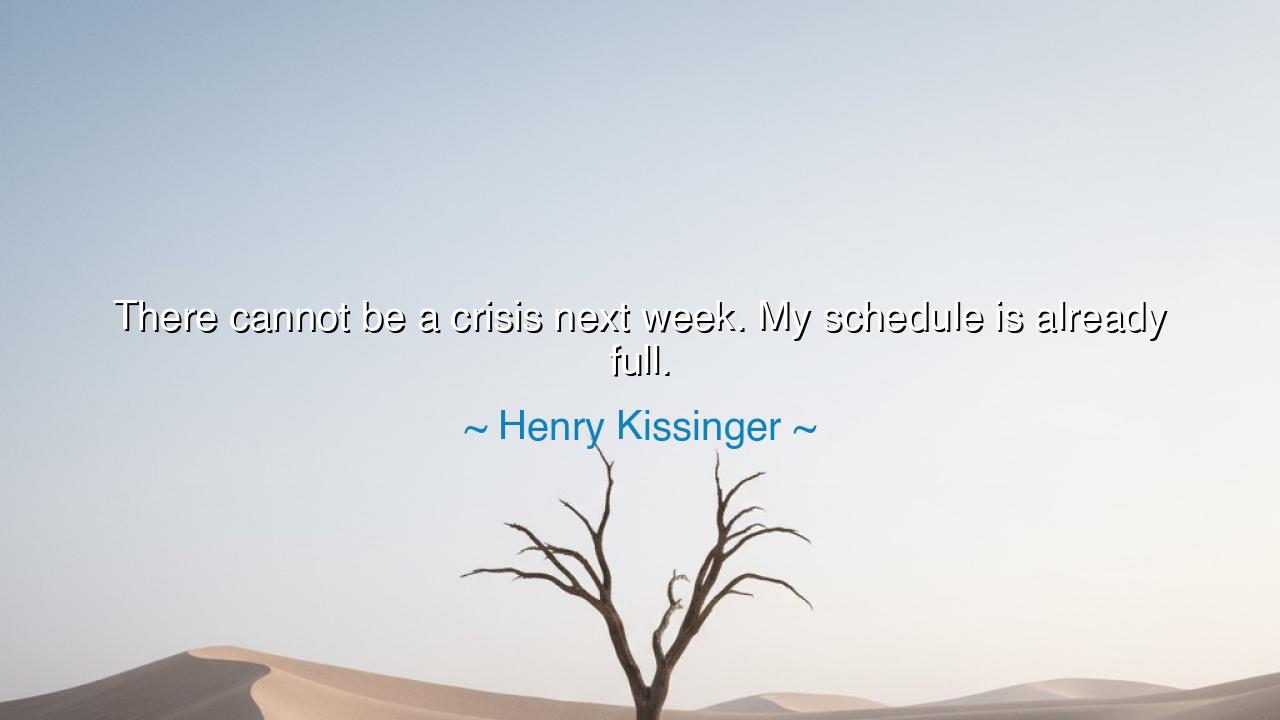
There cannot be a crisis next week. My schedule is already full.






Listen, O children of the earth, to the words of Henry Kissinger, a man who, in his wit and wisdom, said, "There cannot be a crisis next week. My schedule is already full." These words, though spoken with a hint of humor, carry a profound truth about the nature of time, priorities, and the inevitable crises that life throws our way. Kissinger, a statesman who navigated the complex world of global diplomacy, understood that life’s challenges often arrive unexpectedly, yet we must find a way to manage our time, balance our responsibilities, and maintain control over the things we can, even amidst the chaos.
In the ancient world, great leaders were not immune to the pressures of governance, war, and diplomacy, yet they understood the importance of time management. Alexander the Great, a conqueror whose empire stretched across continents, was a master not only of military strategy but also of managing his resources—most notably, his time. Even in the midst of battle, Alexander knew that the future could not be shaped without careful planning and balance. His campaigns were not the result of unbridled haste, but of strategy and foresight. Similarly, Kissinger’s words remind us that priorities must be carefully set and that the unknown challenges of the future cannot overshadow the important tasks that demand our attention today.
Kissinger’s humor speaks to the nature of the human experience—how often do we find ourselves consumed by the demands of life, only to be overwhelmed by the next crisis? His statement reveals the balance we must find between immediate concerns and the greater picture. Life is unpredictable, and challenges often arrive when we least expect them. Yet, just as the great leaders of the past managed to conquer empires and overcome obstacles, so too must we learn to manage our own lives and time with intention, recognizing that some things, while urgent, may not be as important as the long-term goals we strive for.
Consider the example of the Roman statesman and general, Julius Caesar, whose life was defined by the constant balancing act of managing a burgeoning empire, political alliances, and military campaigns. Caesar’s success was not due to his ability to tackle every crisis immediately, but rather his strategic thinking—his ability to prioritize the most crucial matters, while also preparing for the unknown. In times of crisis, he would focus his energy on what mattered most, rather than succumbing to the panic that often accompanies urgent situations. Like Kissinger, Caesar knew that being prepared meant being able to navigate crises without being overwhelmed by them.
The lesson here, O children of the earth, is one of balance, foresight, and control. Kissinger’s words remind us that while we must remain open to the unexpected and prepared for the inevitable crises that life will throw our way, we must also recognize the importance of prioritizing the things that truly matter. The world will always be filled with urgent demands, but it is the calm resolve of those who can manage their time and energy wisely that allows them to meet the future with strength and purpose.
In your own lives, O seekers of wisdom, learn the art of prioritizing. Understand that time is one of your most precious resources, and it is up to you to manage it wisely. Just as Kissinger humorously states that his schedule is already full, take a moment to reflect on how you are allocating your time. Are you spending it on things that truly matter, or are you being overwhelmed by the chaos of the moment? Plan ahead, and when crises inevitably arise, approach them with calm and clarity, knowing that the challenges you face are not the sum of your existence, but rather moments to be navigated with wisdom and purpose.
Remember, O children of the earth, that the greatness of a person is not measured by how quickly they react to the latest crisis, but by how well they prepare for the future and how carefully they manage the present. Kissinger’s words are not simply about time management—they are a reminder that we must live intentionally, with purpose, and with the awareness that life will always present challenges. The key lies in how we balance those challenges with the long-term vision that shapes our future. Let us live our lives with strategy and foresight, preparing for the unexpected while always keeping our eyes on the horizon.






AAdministratorAdministrator
Welcome, honored guests. Please leave a comment, we will respond soon